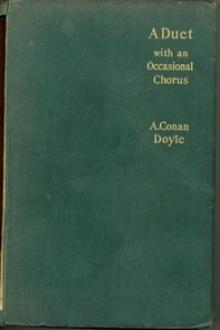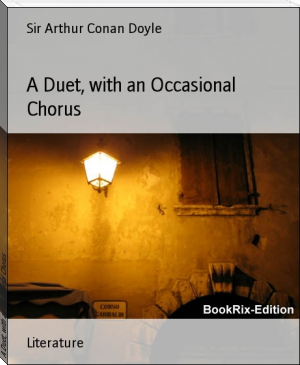A Duet (with an occasional chorus) - Arthur Conan Doyle (best classic books to read TXT) 📗

- Author: Arthur Conan Doyle
- Performer: -
Book online «A Duet (with an occasional chorus) - Arthur Conan Doyle (best classic books to read TXT) 📗». Author Arthur Conan Doyle
‘Forty pounds,’ said Jack firmly.
Maude expected Mr. Wingfield to rise up and leave the room. As he did not do so, nor show any signs of violence, she said, ‘Yes, forty pounds.’
He shook his head.
‘Dear me, Mrs. Crosse, this is a very small sum.’
‘Forty pounds is our offer,’ said Jack.
‘But on what is this offer based?’
‘We have worked it out,’ said Jack, ‘and we find that forty pounds is right.’
Mr. Wingfield rose from his chair.
‘Well,’ said he, ‘of course any offer is better than no offer. I cannot say what view the directors may take of this proposal, but they will hold a board meeting this afternoon, and I will lay it before them.’
‘And when shall we know?’
‘I could send you round a line by hand to your solicitor.’
‘No hurry about it! Quite at your own convenience!’ said Jack. When he got outside, in the privacy of their hansom, he was convulsed with the sense of his own achievements.
‘Class A, Number 1, and mentioned at the Agricultural Hall,’ he cried, hugging himself in his delight. His sister hugged him also, so he was a much-embraced young man. ‘Am I not a man of business, Maude? You can’t buy ‘em—you must breed ‘em. One shilling with the basket. I shook him in the first round, and he never rallied after.’
‘You are a dear good boy. You did splendidly.’
‘That’s the way to handle ‘em. He saw that I was a real fizzer and full of blood. One business man can tell another at a glance.’
Maude laughed, for Jack, with his cavalry swagger and a white weal all round his sunburned face to show where his chin-strap hung, looked the most unbusiness-like of mortals.
‘Why did you offer forty pounds?’ she asked.
‘Well, you have to begin somewhere.’
‘But why forty?’
‘Because it is what we offer when we are buying the hairies— trooper’s chargers, you know. It’s a great thing to have a fixed rule in business. I never go higher than forty—rule one, section one, and no exceptions in the margin.’
They lunched together at the Holborn, and Jack took Maude afterwards to what he called ‘a real instructive show,’ which proved to be a horse-sale at Tattersall’s. They then drove back to the lawyer’s, and there they found a letter waiting addressed to Mrs. Crosse. Maude tore it open.
‘Dear Mrs. Crosse,’ said this delightful note, ‘I am happy to be able to inform you that the directors have decided to stop the legal proceedings, and to accept your offer of forty pounds in full satisfaction of all claims due against your husband.’
Maude, Jack, and the good Owen performed a triumphant pas de trois.
‘You have done splendidly, Mrs. Crosse, splendidly!’ cried Owen. ‘I never heard a better day’s work in my life. Now, if you will give me your cheque and wait here, I will go over and settle everything.’
‘And please bring the bond back with you,’ said Maude.
So it was that Frank, coming down upon the morning of his birthday, perceived a pretty silver cigarette-box laid in front of his plate.
‘Is this for me, my darling?’
‘Yes, Frank, a wee present from your wife.’
‘How sweet of you! I never saw such a lovely case. Why, there’s something inside it.’
‘Cigarettes, I suppose.
‘No, it is a paper of some kind. “Hotspur Insurance Company.” Good Lord, I never seem for one instant to be able to shake that infernal thing off! How on earth did it get in there? What’s this?—“I hereby guarantee to you—” What’s this? Maude, Maude, what have you been doing?’
‘Dear old boy,’ she cried, as she put her arms round him. ‘Dear old boy! Oh, I DO feel so happy!’
It all began by Mrs. Hunt Mortimer, the smart little up-to-date wife of the solicitor, saying to Mrs. Beecher, the young bride of the banker, that in a place like Woking it was very hard to get any mental friction, or to escape from the same eternal grooves of thought and conversation. The same idea, it seemed, had occurred to Mrs. Beecher, fortified by a remark from the Lady’s Journal that an internal intellectual life was the surest method by which a woman could preserve her youth. She turned up the article—for the conversation occurred in her drawing-room—and she read extracts from it. ‘Shakespeare as a Cosmetic’ was the title. Maude was very much struck, and before they separated they had formed themselves into a Literary Society which should meet and discuss classical authors every Wednesday afternoon at each other’s houses. That one hour of concentrated thought and lofty impulse should give a dignity and a tone to the whole dull provincial week.
What should they read? It was well that they should decide it before they separated, so as to start fair upon the next Wednesday. Maude suggested Shakespeare, but Mrs. Hunt Mortimer thought that a good deal of it was improper.
‘Does it matter?’ said Mrs. Beecher. ‘We are all married.’
‘Still I don’t think it would be quite nice,’ said Mrs. Hunt Mortimer. She belonged to the extreme right on matters of propriety.
‘But surely Mr. Bowdler made Shakespeare quite respectable,’ Mrs. Beecher argued.
‘He did his work very carelessly. He left in much that might be dispensed with, and he omitted a good deal which was quite innocent.’
‘How do you know?’
‘Because I once got two copies and read all the omissions.’
‘Why did you do that?’ asked Maude mischievously.
‘Because I wanted to make sure that they HAD been omitted,’ said Mrs. Hunt Mortimer severely.
Mrs. Beecher stooped and picked an invisible hairpin out of the rug. Mrs. Hunt Mortimer continued.
‘There is Byron, of course. But he is so very suggestive. There are passages in his works—’
‘I could never see any harm in them,’ said Mrs. Beecher.
‘That is because you did not know where to look,’ said Mrs. Hunt Mortimer. ‘If you have a copy in the house, Mrs. Beecher, I will undertake to make it abundantly clear to you that he is to be eschewed by those who wish to keep their thoughts unsullied. Not? I fancy that even quoting from memory I could convince you that it is better to avoid him.’
‘Pass Byron,’ said Mrs. Beecher, who was a very pretty little kittenish person, with no apparent need of any cosmetics, literary or otherwise. ‘How about Shelley?’
‘Frank raves about Shelley,’ observed Maude.
Mrs. Hunt Mortimer shook her head.
‘His work has some dreadful tendencies. He was, I am informed, either a theist or an atheist, I cannot for the moment recall which— I think that we should make our little course as improving as possible.’
‘Tennyson,’ Maude suggested.
‘I have been told that his meaning is too clear to entitle him to rank among the great thinkers of our race. The lofty thought is necessarily obscure. There is no merit in following a poem which is perfectly intelligible. Which leads us to—’
‘Browning!’ cried the other ladies.
‘Exactly. We might form a little Browning Society of our own.’
‘Charming! Charming!’
And so it was agreed.
There was only one other point to be settled at this their inaugural meeting, which was, to choose the other ladies who should be admitted into their literary circle. There were to be no men.
‘They do distract one so,’ said Mrs. Hunt Mortimer.
The great thing was to admit no one save those earnest spirits who would aspire to get the full benefit from their studies. Mrs. Fortescue could not be thought of, she was much too talkative. And Mrs. Jones had such a frivolous mind. Mrs. Charles could think and talk of nothing but her servants. And Mrs. Patt-Beatson always wanted to lay down the law. Perhaps on the whole it would be better to start the society quietly among themselves, and then gradually to increase it. The first meeting should be next Wednesday, at Mrs. Crosse’s house, and Mrs. Hunt Mortimer would bring her complete two-volume edition with her. Mrs. Beecher thought that one volume would be enough just at first, but Mrs. Hunt Mortimer said that it was better to have a wide choice. Maude went home and told Frank in the evening. He was pleased, but rather sceptical.
‘You must begin with the simpler things first,’ said he. ‘I should recommend Herve Riel and Gold Hair.’
But Maude put on the charming air of displeasure which became her so well.
‘We are serious students, sir,’ said she. ‘We want the very hardest poem in the book. I assure you, Frank, that one of your little faults is that you always underrate a woman’s intelligence. Mrs. Hunt Mortimer says that though we may be less original than men, we are more assim—more assmun—’
‘Assimulative.’
‘That’s what I say—assimulative. Now, you always talk as if—oh yes, you do! No, you mustn’t! How absurd you are, Frank! Whenever I try to speak seriously to you, you always do that and spoil everything. How would you like to discuss Browning if at the end of every sentence somebody came and kissed you? You wouldn’t mind! No, I dare say not. But you would feel that you were not being taken seriously. Wait till the next time YOU are in earnest about anything—you’ll see!’
The meeting was to be at three o’clock, and at ten minutes to the hour Mrs. Hunt Mortimer arrived with two large brown volumes under her arm. She had come early, she said, because there was to be a rehearsal of the amateur theatricals at the Dixons’ at a quarter-past four. Mrs. Beecher did not appear until five minutes after the hour. Her cook had quarrelled with the housemaid, and given instantaneous notice, with five people coming to dinner on Saturday. It had upset the lady very much, and she explained that she would not have come if she had not promised. It was so difficult to follow poetry when you were thinking about the entree all the time.
‘Why the entree?’ asked Mrs. Hunt Mortimer, looking up from the book which she held open in front of her.
‘My dear,’ said Mrs. Beecher, who had the art of saying the most simple things as if they were profoundly confidential secrets,—‘My dear, my parlourmaid is really an excellent cook, and I shall rely upon her if Martha really goes. But she is limited, very limited, and entrees and savouries are the two things in which I cannot entirely trust her. I must, therefore, find some dish which is well within her capacity.’
Mrs. Hunt Mortimer prided herself upon her housekeeping, so the problem interested her. Maude also began to feel the meeting less dull than she had expected.
‘Of course there are many things to be considered,’ said Mrs. Hunt Mortimer, with the air of a Q.C. giving an opinion. ‘Oyster patties or oyster vol-au-vents—’
‘Oysters are out of season,’ said Maude.
‘I was about to say,’ Mrs. Hunt Mortimer continued, with admirable presence of mind, ‘that these entrees of oysters are inadmissible because they are out of season. Now curried prawns—’
‘My husband loathes them.’
‘Well, well! What do you say to sweetbreads en caisse? All you want are chopped mushrooms, shalots, parsley, nutmeg, pepper, salt, breadcrumb, bacon fat—’
‘No, no,’ cried Mrs. Beecher despairingly. ‘Anne would never remember all that.’
‘Cutlets a la Constance,’ said Mrs. Hunt Mortimer. ‘I am sure that they are simple enough. Cutlets, butter, fowls’ livers, cocks’ combs, mushrooms—’
‘My dear, my dear, remember that she is only





Comments (0)